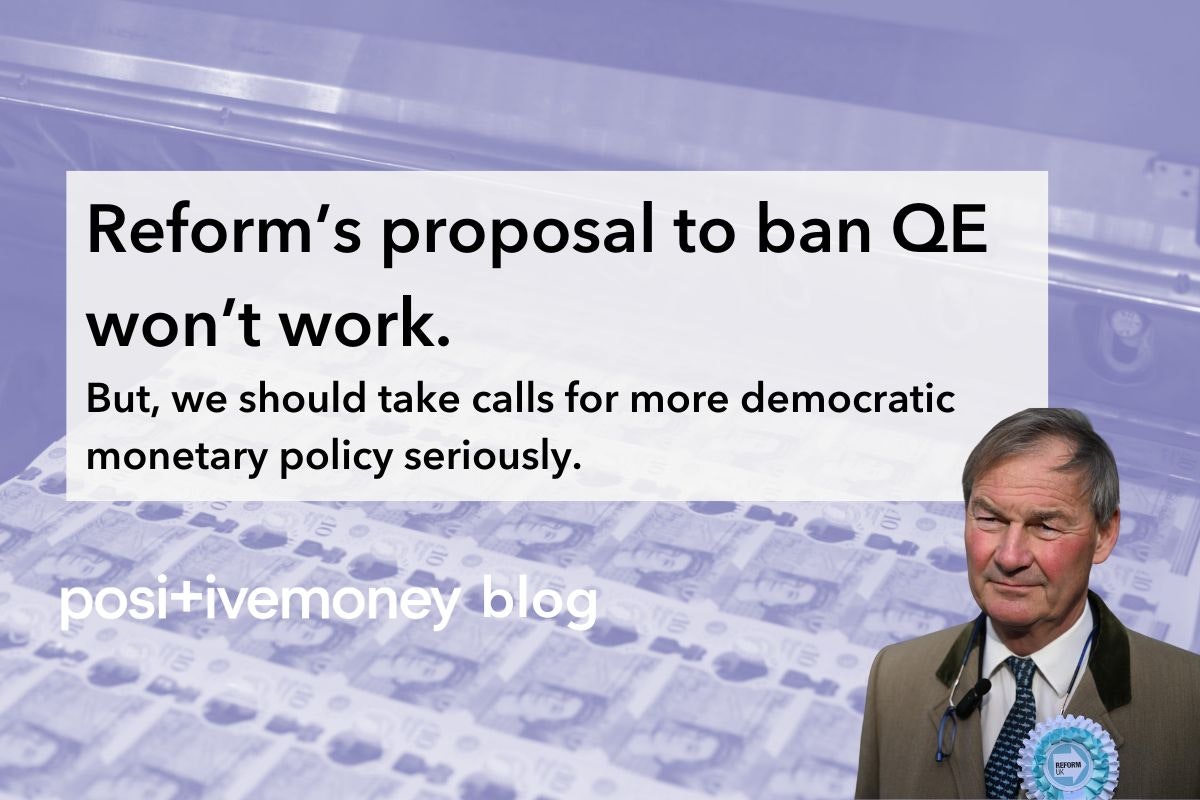
EUUK
3 July 2025
Reform UK have no idea how money works - but their proposal to ban QE and stop the public bearing the costs of bank profits should be a wake up call to the Government to fix our broken framework for monetary policy
Last week, Reform UK MP Rupert Lowe put forward a proposal in Parliament that would radically shake up our money system and economy: to ban Quantitative Easing (QE) unless express parliamentary approval is given, and to stop the public from footing the bill for the huge profits private banks have seen as a result of its reversal (called Quantitative Tightening, or QT - we’ll explain how this works below).
QE is the practice of central banks creating money to buy financial assets including government and corporate bonds. It was undertaken on a huge scale globally following the 2008 financial crisis, in an attempt to stimulate the economy. With a flawed description of QE as a form of ‘money printing’, Lowe argued it ought to be banned due to it reducing the value of our currency, driving inflation and making people poorer. As we explained back when Liz Truss was making these same arguments before her brief premiership in 2022, this rests on the misguided idea that inflation is simply driven by ‘too much money chasing too few goods’. Not only does this ignore the key drivers of high consumer price inflation in recent years - including supply shocks, extreme weather, and corporate profiteering, but it also fundamentally misrepresents both our money system and how QE actually works.
That modern money is a commodity that ‘replaced barter in the earliest communities’, is a myth that has been thoroughly debunked. Instead, the majority of today’s money (around 80%, or 97% if you exclude the central bank money - ‘reserves’ - that can’t leave the banking system) is created by private banks creating deposits when they issue loans. And when central banks create money through QE, they swap this new money (in the form of central bank reserves) for financial assets that act very much like money in financial markets - so QE itself doesn’t create new purchasing power directly. QE is therefore nothing like the printing of paper cash in Weimar Germany, or Ancient Rome reducing the size of coins, that Lowe draws comparisons to - despite the compellingly simple logic. Banning or requiring express approval of QE would also leave us vulnerable in times of crisis, which is often when QE is most useful.
All of this doesn’t mean however that the Government shouldn’t take seriously some of the arguments made by the far-right MP (whom Elon Musk has voiced support for as a future party leader), and the very real public grievances from which they’ve emerged. Namely, growing dissent over the way that our economic system and monetary policy framework has driven inequality and, in recent years, has enriched the banking sector whilst making the rest of us poorer.
There’s little evidence to support Reform’s theory that QE drove the recent inflation in the consumer price figures that politicians and central bankers focus on. But QE has contributed to making many of us poorer in other ways - mainly by exacerbating inflation of house prices that has caused a severe affordability crisis and heightened inequalities across generations and ethnicities. That’s because when central banks buy financial assets from investors through QE, it makes those assets less attractive (as fewer of them on the market makes prices go up, lowering yields) and encourages firms to instead buy other assets like property as investments, with the greater demand pushing up house prices.
Whilst it didn’t make the headlines, Reform also proposed prohibiting the Government from ‘indemnifying any losses that might result from QT and for connected purposes’. As Positive Money and many others have been ringing the alarm on since interest rates began rising in 2021, private banks have been receiving huge profits at public expense in recent years. This is due to the way the Bank of England pays interest at the base rate on the reserves that banks hold with them. A higher base rate means these payments to banks are no longer covered by the income the Bank of England receives from the bonds it holds. Meanwhile, the BoE is also making significant capital losses from selling bonds for less than it originally paid for them, via QT. Unlike the other major central banks who did QE, the Bank of England’s scheme is ‘indemnified’ - meaning any losses the Bank makes have to be covered by the Treasury. This means the government is effectively footing the bill for banks’ bumper profits whilst considering cuts to public services in order to stick to its spending rules.
Unlike Reform’s manifesto pledge to completely stop paying interest on central bank reserves - which would be impractical given that paying interest on reserves is used to implement monetary policy - prohibiting the Treasury from indemnifying QE could look more like the way the US Fed deals with these losses. Instead of the US Treasury paying the Fed, the losses are kept on the Fed’s balance sheet by creating something called a ‘deferred asset’ - essentially a debt it owes itself, to pay off in the future when it resumes making profits.
Whilst this would stop the immediately restrictive impact on Government spending, it wouldn’t resolve the issue of billions in public money being paid to banks during a time of economic hardship and increasing inequality. In the short term, the money would just be coming from the Bank of England rather than the Treasury. In the long-term, however, the Treasury would forgo payments it usually received from the Bank of England’s profits, at least until the deferred assets are paid off. Reducing interest payments in the first place, such as by only paying interest on a portion of reserves (as has been proposed by the New Economics Foundation) rather than scrapping them all together, as well as fairer taxation of banks, would be a better place to start.
Despite Reform’s misrepresentation of money and QE, it’s positive to see attention being drawn to the inequalities that monetary policy is driving. As the Government trails spending cuts due to higher borrowing costs, the political implications of monetary policy are becoming all the more stark, and with bank taxation the third most popular option for tax rises amongst the public (after taxes on betting and capital gains), transfers of public money to the banking sector are becoming harder to defend. Measures should absolutely be taken to address the distributional impact of monetary policy, but its politicisation also points to a broader issue of central bank accountability.
As Positive Money argued back in 2019, the growing powers of central banks since the 2008 financial crisis did not come with commensurate provisions to keep the Bank of England democratically accountable. We face multiple challenges that monetary policy is exacerbating, from growing inequality to an intensifying housing crisis, and existential threats from the climate and nature crisis. With criticism of a lack of central bank accountability coming from across the political spectrum, now is the time for the Government to tackle the growing problem of a lack of coordination between monetary and fiscal policy, undertake a long-overdue review of the UK’s framework for monetary policy, and with it, take seriously the question of how to ensure monetary policy is accountable and working in the public interest.
Sign-up to our mailing list for regular updates, or donate to support our work to redesign our economic system for social justice and a liveable planet.
